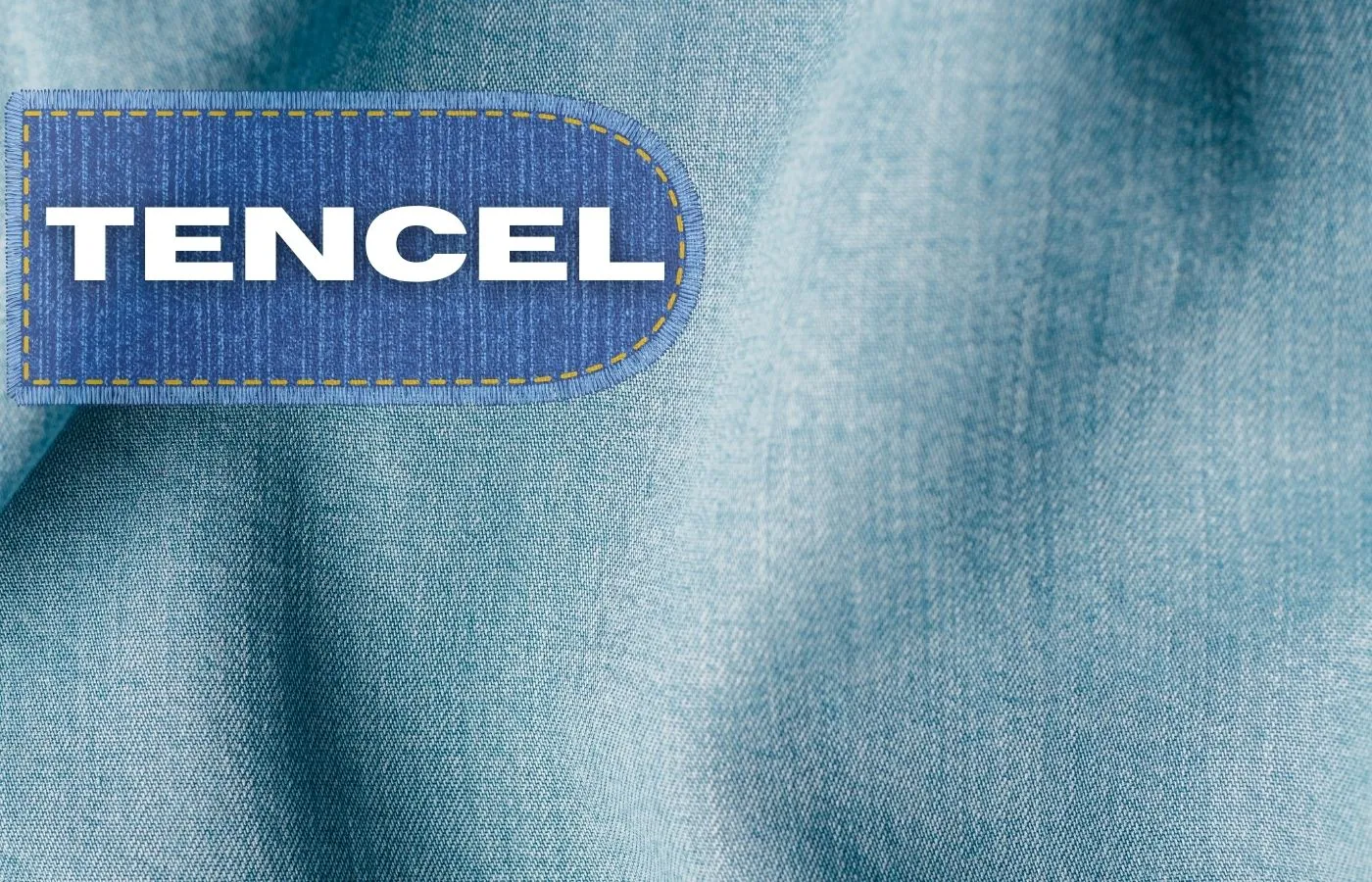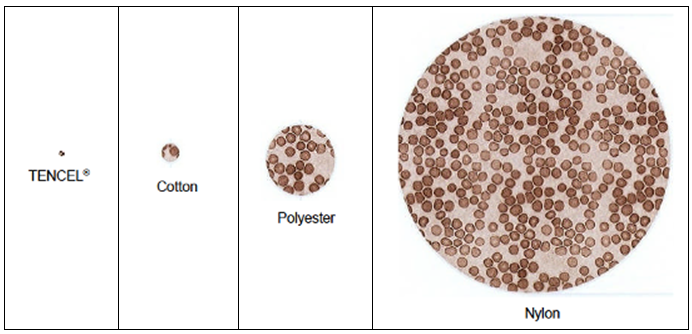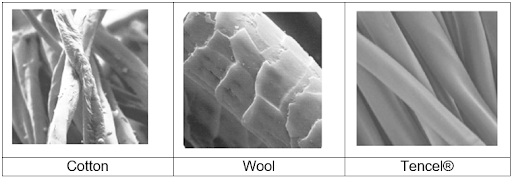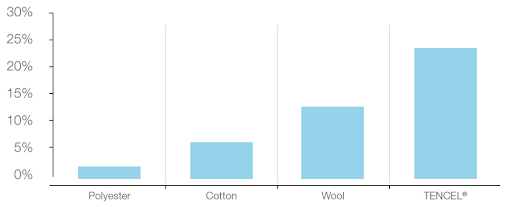The Benefits of Wearing Tencel in Fabrics

Introduction
In the ever-evolving world of fashion and textiles, Tencel has emerged as a front-runner for those seeking comfort, style, and sustainability. This remarkable material, known for its versatility and eco-friendly qualities, has transformed the fabric industry. This blog post delves into the myriad benefits of Tencel in fabrics, a choice that is not only good for you but also for the environment.
Understanding Tencel: A Sustainable Revolution
Tencel is a trademarked brand name owned by the Austrian company Lenzing AG. It represents a new era in fiber technology, being extracted from the cellulose found in wood pulp. The process of creating Tencel® involves weaving it alongside other fibers, enhancing its physical properties. More than just a textile, Tencel® is celebrated for its environmental credentials – it's a regenerated, sustainable fiber that is winning the hearts of eco-conscious consumers and designers alike.
Exploring the Unique Properties of Tencel
Tencel stands out in the textile industry for its remarkable properties.
- Machine, Hand, and Dry Cleaning Compatible: Tencel fabrics are exceptionally easy to care for. They can be safely washed in a washing machine, by hand, or dry-cleaned, making them versatile for various types of garments and household textiles. This adaptability in maintenance ensures longevity and ease of use for consumers.
- High Colour Fastening Properties: Tencel fibers exhibit superior color retention. This means that garments made from Tencel maintain their vibrant hues through many washes, resisting fading and keeping their aesthetic appeal over time.
- Eco-Friendly: Tencel is produced through an environmentally responsible process, using sustainably sourced wood and a closed-loop system that recycles almost all solvents and water. This process significantly reduces the ecological footprint compared to many other fibers, making Tencel a favorite among eco-conscious brands and consumers.
- High Bacterial Resistance: The inherent properties of Tencel fibers offer natural bacterial resistance, which is beneficial for skin health and hygiene. This makes Tencel particularly suitable for sensitive skin and for use in medical textiles, as well as in sportswear where sweat resistance is important.

Bacterial growth in difference fibers
- Enhanced Softness and Drape: Tencel fibers are known for their extraordinary softness, providing a silky-smooth feel against the skin. Additionally, these fibers contribute to a beautiful drape in fabrics, giving garments a luxurious, flowing appearance.

Microscopic picture of natural fibers which clearly show the smooth surface of fiber
- Natural Fiber: Extracted from wood cellulose, Tencel is a natural fiber. This aspect appeals to those seeking products made from renewable sources, contributing to its popularity in the market for natural textiles.
- Durability: Despite its softness, Tencel is remarkably durable. It resists wear and tear, making it a practical choice for everyday clothing and heavy-use items like bedding and towels.
- Withstands High Temperature Industrial Laundering: Tencel can endure high-temperature laundering, a property valued in industrial settings like hospitals and hotels, where textiles often undergo rigorous cleaning processes.
- Smooth Surfaces: The smooth surface of Tencel fibers ensures that fabrics are gentle on the skin, reducing the likelihood of irritation. This smoothness also lends a lustrous sheen to fabrics, enhancing their visual appeal.
- Excellent Moisture Absorption and Breathability: Tencel fibers excel at absorbing moisture, making them ideal for warm climates and active wear. Their breathability adds to comfort, helping regulate body temperature and keeping the wearer cool and dry.
- Positive Skin Climate: Tencel's natural properties contribute to a healthy skin environment, reducing the risk of irritation and allergies. This makes it a preferred choice for those with sensitive skin or for baby clothing.
- Improved Wearer Comfort and Garment Appearance: The combination of moisture management, softness, and breathability results in high wearer comfort. This, along with the aesthetic benefits like drape and smoothness, significantly enhances the overall appearance of Tencel garments.
Industries Embracing Tencel: A Comprehensive Overview
Fashion Industry: The rise of Tencel in fashion is undeniable. Its elegant drape and soft touch make it a favorite for luxury designers, while its resilience and comfort cater to mainstream clothing lines. Tencel's ability to blend with various fibers allows for an array of textures and designs, making it versatile for everything from airy summer outfits to warm winter attire. Its eco-friendly attributes are also in line with the sustainable fashion movement, positioning Tencel as a key material in environmentally conscious collections.
Hospitality and Healthcare Sectors: Tencel's role in hospitality and healthcare is invaluable. In these sectors, the need for fabrics that can endure rigorous cleaning and sterilization is critical. Tencel stands up to the challenge, maintaining its quality and comfort even under high-temperature laundering. Its antibacterial properties are particularly advantageous in healthcare environments to help control infection. In hospitality, Tencel's luxurious feel and visual appeal contribute to a superior guest experience, enhancing comfort and style in bedding and upholstery.
Sportswear and Active Apparel: Tencel is transforming the sportswear industry. Its moisture-wicking ability is a boon for athletes and fitness enthusiasts, keeping them dry and comfortable. This property is crucial for temperature regulation and optimal performance. Tencel is also gentle on the skin, preventing irritation often caused by synthetic materials. Its environmental sustainability is an added bonus, meeting the eco-friendly demands of modern sports and outdoor apparel.
Safety Products Industry: In the field of safety products, Tencel has made a notable impact. The material's robustness is ideal for creating protective clothing that needs to resist constant wear. Its inherent antibacterial traits and ability to manage moisture are vital for maintaining hygiene and comfort in safety gear like gloves and breathable protective outfits. Tencel's eco-friendly nature is also aligning with the industry’s shift towards sustainable safety solutions, making it a top choice for environmentally conscious safety product manufacturers.
Tencel's widespread adoption across various industries highlights its unique blend of comfort, durability, and sustainability. From fashion to safety gear, Tencel's versatility makes it an integral material in diverse sectors.
Wearing Tencel: A Blend of Comfort and Sustainability
Comfortable Feel
Tencel's softness and smooth texture provide unmatched comfort against the skin, making it a favorite for everyday wear and luxury garments alike.
Breathability
The breathable nature of Tencel fibers ensures air circulation and moisture absorption, which is beneficial in varied climates.
Moisture Management
With excellent moisture-wicking properties, Tencel keeps the body dry, making it ideal for active wear and summer clothing.

Moisture management
Environmental Sustainability
As a product derived from sustainably sourced wood pulp, Tencel stands as an environmentally responsible choice, especially when compared to some synthetic fabrics.
Biodegradability
Tencel's biodegradable nature further reduces its environmental impact, making it a forward-thinking choice for the eco-conscious.
Versatility
Tencel's ability to blend seamlessly with other fibers allows for a diverse range of clothing styles, from casual to couture.
Antibacterial Properties
The natural antibacterial properties of Tencel help in reducing odors and promoting better hygiene, which is especially important in intimate and active wear.
Drapability
The smooth and fluid drape of Tencel fabrics adds to the aesthetic appeal of garments, enhancing their look and feel.
Conclusion
Tencel in fabrics is not just a trend; it's a testament to how innovation and sustainability can come together to create something truly remarkable. Its unique properties - from comfort to environmental friendliness - make it a smart choice for anyone looking to make a positive impact on both their wardrobe and the planet. As the textile industry continues to evolve, Tencel stands out as a beacon of sustainable fashion, promising a future where style and sustainability are in perfect harmony.
